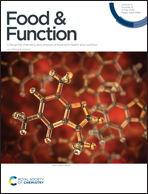Chitosan oligosaccharides exert neuroprotective effects via modulating the PI3K/Akt/Bcl-2 pathway in a Parkinsonian model†
Abstract
Parkinson's disease (PD), the second most common neurodegenerative disease, is a threat to patients due to the inability to prevent or decelerate disease progression. Currently, most clinical drugs for the treatment of PD are synthetic drugs that always present undesirable adverse or toxic effects. Chitosan oligosaccharide (COS) is a natural oligosaccharide that has been considered relatively safe and studied in the therapeutic effects on different types of neuronal disorders. In this study, we separated four COS monomers (COSs) including chitobiose (COS2), chitotriose (COS3), chitotetraose (COS4) and chitopentaose (COS5) to explore their structure–activity relationship in PD mice induced by 1-methyl-4-phenyl-1,2,3,6-tetrahydropyridine (MPTP). Techniques including TLC, HPLC, MS, and NMR were applied to investigate the purity and structure of the COSs. After the oral administration of COSs, behavior indexes, pathological indexes, cytokines, and expression of proteins in the nigrostriatal pathway of the mice were analyzed. The results showed that the four COSs were fully deacetylated and the purity was >90%. Additionally, the neurobehavioral deficits of the PD mice were improved by treatment with COSs. The results further proved that COSs could protect the TH-labelled dopaminergic neurons via reducing the overexpression of α-synuclein, alleviating neuroinflammation, and activating the PI3K/Akt/Bcl-2 pathway to reduce apoptosis. COS3 exhibited a better effect on protecting dopaminergic neurons; however, COS2 provided a better effect on reducing the overexpression of α-synuclein. To conclude, the neuroprotective activity makes COSs a viable candidate as an ingredient for healthcare products.



 Please wait while we load your content...
Please wait while we load your content...